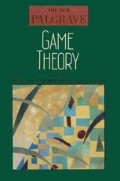Abstract
Repeated game is a generic name for any model where players take simultaneous actions alternately and then a lottery, depending on those actions and the current state of nature, selects jointly a new state of nature, and a private signal and current payoff for each player. Players are interested in some long-term average of the payoffs.
Access this chapter
Tax calculation will be finalised at checkout
Purchases are for personal use only
Preview
Unable to display preview. Download preview PDF.
Bibliography
Akerlof, G. 1970. The market for `lemons’, qualitative uncertainty and the market mechanism. Quarterly Journal of Economics 84, 488–500.
Aumann, R.J. 1974. Subjectivity and correlation in randomized strategies. Journal of Mathematical Economics 1, 67–95.
Aumann, R.J. 1985. Repeated games. In Issues in Contemporary Microeconomics and Welfare, ed. G.R. Feiwel, London: Macmillan.
Aumann, R.J. and Hart, S. 1986. Bi-convexity and bi-martingales. Israel Journal of Mathematics 54, 159–80.
Aumann, R.J. and Maschler, M. 1968. Repeated games of incomplete information: the zero-sum extensive case. In Mathematica (Report to the US Arms Control and Disarmament Agency), ST-143, ch. I II, 37–116 (prepared by Mathematica Inc., Princeton).
Bewley, T. and Kohlberg, E. 1976a. The asymptotic theory of stochastic games. Mathematics of Operations Research 1, 197–208.
Bewley, T. and Kohlberg, E. 1976b. The asymptotic solution of a recursion equation occurring in the stochastic games. Mathematics of Operations Research 1, 321–36.
Bewley, T. and Kohlberg, E. 1978. On stochastic games with stationary optimal strategies. Mathematics of Operations Research 3, 104–25.
Forges, F. 1982. Infinitely repeated games of incomplete information: symmetric case with random signals. International Journal of Game Theory 11, 203–13.
Forges, F. 1984a. A note on Nash equilibria in repeated games with incomplete information. International Journal of Game Theory 13, 179–87.
Forges, F. 1984b. Communication equilibria in repeated games with incomplete information. CORE Discussion Papers 8406, 8411, 8412, Louvain-la-Neuve, Belgium.
Forges, F. 1986. An approach to communication equlibria. Econometrica 54 (6), 1375–86.
Harsanyi, J.C. 1967–8. Games of incomplete information played by Bayesian players. Management Science 14, Pt I, 159–82; Pt II, 320–34; Pt III, 486–502.
Hart, S. 1985. Nonzero-sum two-person repeated games with incomplete information. Mathematics of Operations Research 10, 117–53.
Kohlberg, E. 1975. Optimal strategies in repeated games with incomplete information. International Journal of Game Theory 4, 7–24.
Mertens, J.-F. 1972. The value of two-person zero-sum repeated games: the extensive-case. International Journal of Game Theory 1, 217–25.
Mertens, J.-F. 1982. Repeated games: an overview of the zero-sum case. In Advances in Economic Theory, ed. W. Hildenbrand, Cambridge: Cambridge University Press.
Mertens, J.-F. and Neyman, A. 1981. Stochastic games. International Journal of Game Theory 10 (2), 53–6.
Mertens, J.-F. and Parthasarathy, T. 1986. Existence and characterization of Nash equilibria for discounted stochastic games. CORE Discussion Paper, Louvain-la-Neuve, Belgium.
Mertens, J.-F. and Zamir, S. 1980. Minmax and maxmin of repeated games with incomplete information. International Journal of Game Theory 9, 201–15.
Milgrom, P. and Roberts, J. 1984. Price and advertising signals of product quality. Mimeo, Stanford University.
Sorin, S. 1986. Asymptotic properties of a non-zero sum stochastic game. International Journal of Game Theory 15, 101–7.
Spence, M. 1974. Market Signalling. Cambridge, Mass.: Harvard University Press.
Editor information
Copyright information
© 1989 Palgrave Macmillan, a division of Macmillan Publishers Limited
About this chapter
Cite this chapter
Mertens, JF. (1989). Repeated Games. In: Eatwell, J., Milgate, M., Newman, P. (eds) Game Theory. The New Palgrave. Palgrave Macmillan, London. https://doi.org/10.1007/978-1-349-20181-5_24
Download citation
DOI: https://doi.org/10.1007/978-1-349-20181-5_24
Publisher Name: Palgrave Macmillan, London
Print ISBN: 978-0-333-49537-7
Online ISBN: 978-1-349-20181-5
eBook Packages: Palgrave Economics & Finance CollectionEconomics and Finance (R0)

